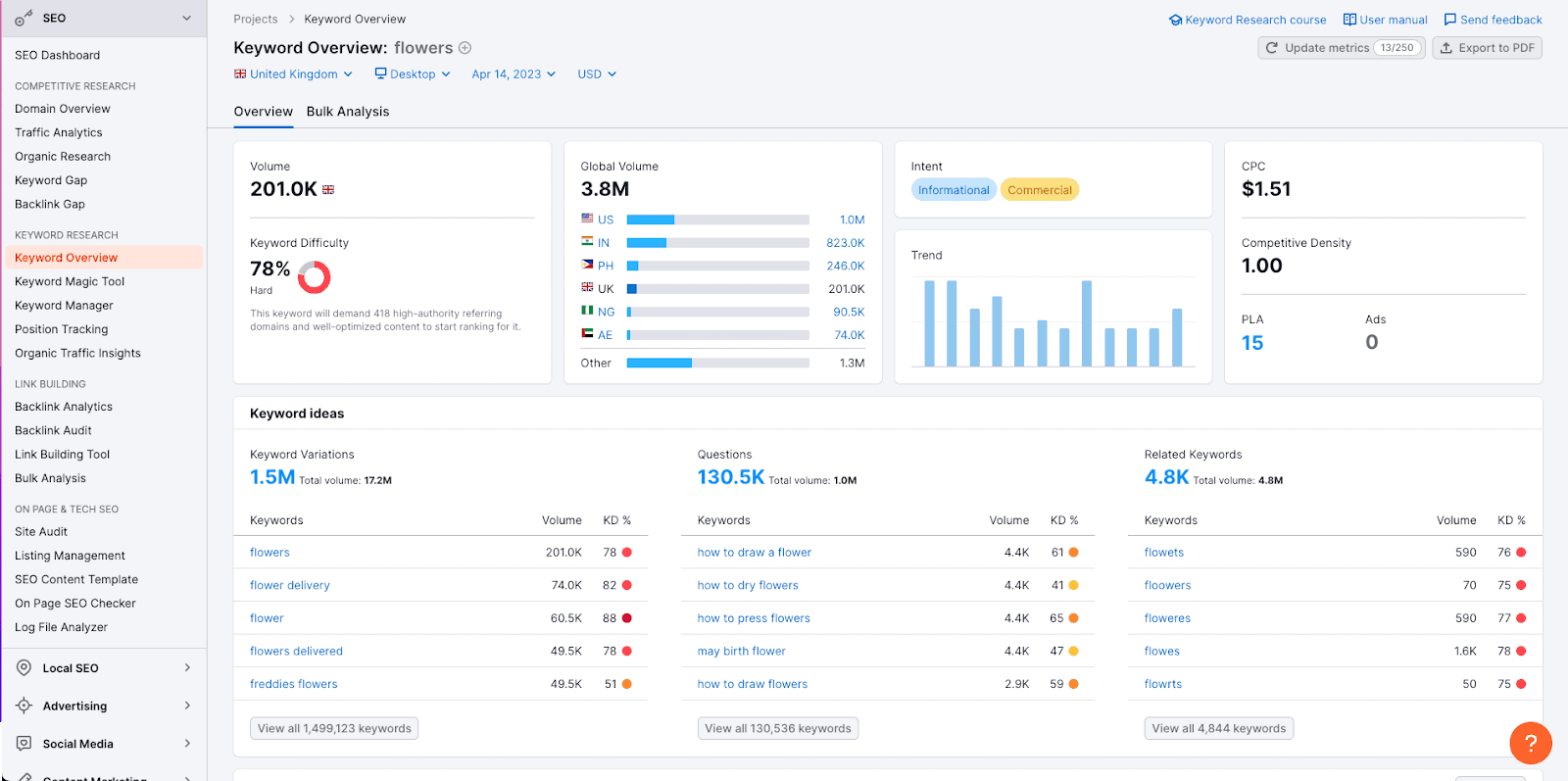The internet makes it easier to target a precise demographic than traditional marketing methods, such as email marketing, which make it almost impossible to reach unique and distinctive audiences.
Having a high-quality website is crucial regardless of your industry or audience size.
Let us walk you through the advantages of niche-driven SEO for your website first, but first, let’s dig a little deeper to understand the niche market.
What is Niche Driven SEO?
A digital marketing method called “niche-driven SEO” focuses on niche target audience segments with common issues or interests.
A niche-driven SEO strategy focuses marketing and advertising efforts on a certain market segment or niche rather than the entire clientele.
With the help of niche-driven SEO, you may rank for your target keywords swiftly and easily.
Furthermore, concentrating on a small set of keywords with low keyword difficulty and a variety of content improves overall CTR and raises rankings.
The best way to maximize your on-page SEO and gain the most ranking power from the content is to use niche-driven SEO before you start hunting for backlinks.
How Do I Find My Niche for SEO?
Are you curious about what high-quality, successful niche market SEO entails? Here are the steps your specialty SEO plan must include.
Analyze What You’re Selling
Finding and defining your niche may seem rash, but having a thorough understanding of your product is crucial.
You should consider what your product is when choosing a niche, as it’s not only about your audience. Your product probably already has a few special characteristics.
You can start out easily by asking whether your product differs in appearance from its rivals’ items.
- Is it a different color or shape?
- Does it have any extra features that other models don’t have?
- Is it a high-end item or a less expensive choice?
- Where can they purchase your goods?
Perhaps you stand out from the competitors because of your specialized expertise or unique experiences, or perhaps it’s because you know the area well.
Such inquiries will enable you to develop a more thorough understanding of what you are offering customers.
Research the Market
Understanding what users are precisely searching for is highly advised before you begin writing content for chosen keywords. In order to do this, examine the top-ranking pages from three angles:
- Is there a search term that is more widely used to find the same thing?
- What purpose does the search serve?
- How difficult would ranking be?
The first characteristic is unique to specialized keywords. Keep in mind that you are browsing unusual search terms. Some of those inquiries might have more widely used counterparts, while others might just be incorrect.

Finding out what Google considers to be the primary driving force behind the search is the second aspect or search intent.
Simply said, it’s usually one of the following three:
- Learn: If the majority of pages, such as manuals, reviews, comparisons, and tutorials, emphasize explaining things.
- Purchase: If the majority of the pages you visit offer products directly, such as landing pages and product category pages.
- Visit a website or location: Keywords will frequently include the name of the thing, place, or brand.
The term is probably a wise choice if you can accurately match search intent and it makes sense for your website.
Make sure, though, that your content is also optimized for search intent.
Research the Competiton
Although there is typically less competition in specialized sectors than in major industries, you should nonetheless research what your rivals are doing.
To develop your own approach, you must first understand what they’re doing and how well it’s working. This doesn’t imply copying your rivals; rather, take what they’re doing and improve upon it tenfold.
By producing high-quality content and using SEO optimization, you can outperform your competitors after learning how they are doing.
This is a wonderful method for identifying the main keywords you should use in your content to outrank your competitors in search results.
Research Traffic in That Niche
The reach of a specialized product and the flow of traffic to your website can both be greatly increased by using specific keywords.
You must conduct research on this and pick keywords that have a high search volume and low keyword difficulty. Your efforts to dominate the SERPs for a keyword with a little volume of searches won’t increase your search visibility or result in a large amount of traffic.
Niche keywords can occasionally be overly particular, which lowers the volume determined by the study. The SEO experts from your company can find such a situation perplexing.
They may select broad-based keywords at the end. A niche client site would never reach its intended audience since such keywords are so fiercely competitive.
Figure Out Your Specialty
What you understand the most is the first question you should ask yourself. What field do you know more about or have more expertise in?
You might have worked in a field unrelated to writing but possessed the specific abilities or information required to write about it.
Your specialty might be anything related to flowers and centerpieces, for instance, if you work as a part-time freelance florist writer.
Work as a full-time freelancer in the writing industry or hold a second job in a subject that is closely related to writing, such as publishing, while developing ideas for a niche website. You can become an expert in writing specifically or develop into one in a different specialty.
Figure Out What Problems You Can Solve
Any successful firm must have a need that it can fill, and this is its guiding principle.
This part of the keyword research we stated earlier is searching the internet for areas where there aren’t any trustworthy, dependable sources disseminating information about your potential niche markets.
There aren’t enough reliable sources when the top results on Google contain websites with inadequate Domain Authority.
So, while you conduct market research, consider the problems your potential clients in your selected sector are facing.
Maybe all you need to do is publish a few articles about kayak construction. With a fantastic specialized website, you can meet that requirement. You can discuss the finest ways to type more quickly or offer some suggestions for kitchen design.
How Do You Check Traffic for a Niche?
If you want to check which keywords and websites are getting tons of traffic for specific keywords, you need to use some effective tools and strategies as they are vital for the success of your niche website.
Use a Backlink Tool
Backlinks from websites that provide information on subjects related to yours are known as niche-relevant backlinks, and they give Google a better idea of your website’s subject matter and the search terms it should be ranked for.
The objective is to obtain links from websites that provide information in the same industry, or at the very least, in the same niche.

The most crucial backlinks to build or spend money on are those relevant to your niche since they help search engines better comprehend your website and enhance the indexing and ranking of your web pages to draw in your B2C or B2B target market.
Some of the best backlink tools include SEMrush, Moz, and Ahrefs.
Use a Keyword Tool
Finding popular search phrases is not sufficient by itself; you also need to make sure that the SEO keywords you use in your content correspond to the terms your customers use to find your brand, product, or service. This is where keyword research comes into play.
Only then will you be able to develop a workable SEO strategy after carrying out a sufficient and complete study. You can then develop a thorough action plan to accomplish your objectives with a solid strategy.
SEMrush, Moz, and Ahrefs again offer some powerful solutions for keyword research.
How to Create Content for Niches
If you are ready to create amazing niche-specific articles, don’t forget to follow some important steps:
Do Your Keyword Research
Long-tail keywords with a high specificity level related to a limited industrial sector are called niche keywords.
It’s crucial to optimize your website and pay-per-click campaigns for specific specialized keywords rather than merely broad, popular ones, which are frequently too challenging to rank for, especially for a new business.

It may be quite challenging to predict the effects of a new search campaign and to come up with an attack strategy for your industry niche when you’re just getting started with a search marketing venture, whether you’re a new affiliate marketer, new to an industry, or releasing a new product.
See What the Competition is Posting
Competitor analysis is studying competitors to find out more about their goods and services, marketing plans, and vulnerabilities.
An effective competitor analysis can yield data that supports strategy development and decision-making for your company.
You can utilize the results of competition analysis in various ways, depending on your company, to understand your industry and the competitive landscape, identify different sorts of rivals, comprehend your market and target audience, and establish benchmarks.
Use an SEO Tool
Finding popular search phrases is not sufficient by itself; you also need to make sure that the SEO keywords you use in your content correspond to the terms your customers use to find your brand, product, or service. This is where keyword research comes into play.
Only then will you be able to develop a workable SEO strategy after carrying out a sufficient and complete study. You can then develop a thorough action plan to accomplish your objectives with a solid strategy.
SEMrush, Moz, and Ahrefs again offer some powerful solutions for keyword research.
Answer Specific Questions Your Target Audience Has
Identifying a specific issue that potential clients of your company are facing is known as finding a pain point. To put it another way, you can consider challenges, pure and simple, to be pain spots.
Customer pain points, like any problem, come in all shapes and sizes, just like your potential consumers.
The fact that some prospects won’t be conscious of the pain point they’re going through might do marketing to them challenging because you’ll need to effectively make your prospects aware of a problem they’re having and persuade them that what you’re selling will help fix it.
You can participate in online forums like Reddit and Quora and discuss with specific audiences.
Repurpose Old Content
One of the most efficient and cost-effective content marketing strategies is repurposing existing material into new formats that are successful across a variety of channels.
A variety of forms that help you reach your clients both online and offline can be created by content marketers using pre-existing content.
Another excellent strategy to save time is repurposing and converting your high-performing content pieces. Instead of coming up with a dozen different marketing content strategies or topics, pick one and develop it in various manners.
Know Where to Promote Your Content
While producing content is critical, promoting what you currently have is just as crucial.
Developing a plan to market what you’ve already put a lot of effort into can significantly influence increasing traffic and brand recognition. You don’t need to publish a bunch of stuff every day.
Additionally, you can benefit more from the effort you’ve previously made than you would if you published a post hastily put together every single day. The secret is to write extremely in-depth articles and then market them appropriately.
You can promote your content on social media, emails, online communities, and forums, and paid ads.
Frequently Asked Questions
What Are Niche Keywords?
In a particular market segment, niche keywords are extremely specialized terms. These terms are frequently long-tail keywords, meaning they can bring in highly targeted traffic with a high likelihood of conversion.
What is the Best Tool for Niche SEO?
Some of the best tools for Niche SEO are Ahrefs, SEMrush, Uberauggest, Keywords Everywhere, and Google Trends.
Wrapping Up
Every specialized company that wishes to reach its target audience and turn them into consumers must use niche-driven SEO methods.
Although growth is not a goal of niche SEO, getting started is essential. Start small and target a particular demographic of clients.
Develop it, then expand it. Aim for relevant reach over greater reach wherever possible.







